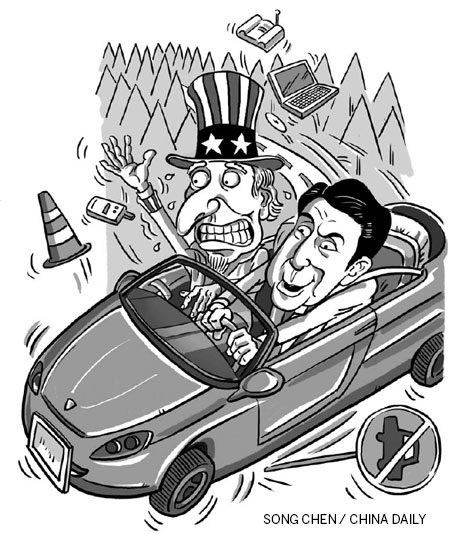
At the Davos Forum last month, Japanese Prime Minister Shinzo Abe tried to refute a prevailing belief among academics that deepening economic interdependence minimizes the chances of war. Instead, he cited what he called Beijing's unchecked expansion and "non-transparent" military budget to portray China as a threat to Japan.
But, according to the authoritative SIPRI Yearbook for 2013, the combined military expenditure of the US-Japan alliance, $741.3 billion, was almost 4.5 times that of China. Since air and naval forces are more likely to decide the fate of a war over the Diaoyu Islands, it is crucial to heed to Western (unproven) estimates that the US-Japan alliance's 5,001 combat aircraft pale China's 2,200 into insignificance. The naval strength of the US-Japan alliance is much stronger, too. Its combined fleet of 88 submarines, for example, eclipses China's 60. The alliance also has more warships than China.
And although starting 2012 China's defense budget, probably for the first time, was twice as big as Japan's, the cold truth is that China has 10 times more people and 25 times more territory to defend than Japan.
The most notorious, and perilous, misreading by Abe is that of the meaning of the Barack Obama administration's "pivot to Asia" policy and its implications for Japan. Abe has miscalculated the policy as an imperative of US reliance on Japan, its ally in Asia, in an attempt to contain China. Therefore, after assuming the prime minister's office for the second time in December 2012, Abe has been aggressively pushing for the pet agenda of Japan's right wing - removal of the restrictive Article 9 from the country's Constitution.
Article 9 in this organic law, drafted with the help of General Douglas McArthur during the American occupation in 1947, explicitly renounces for Japan the "sovereign right" to war, or use of force, to settle international disputes. Abe's intent in seeking the revision of the "pacifist Constitution" is clear, especially when seen against the background of his bellicose policy toward China. But given its American authorship, any attack on the "pacifist Constitution" is tantamount to a slap in the face of the United States.